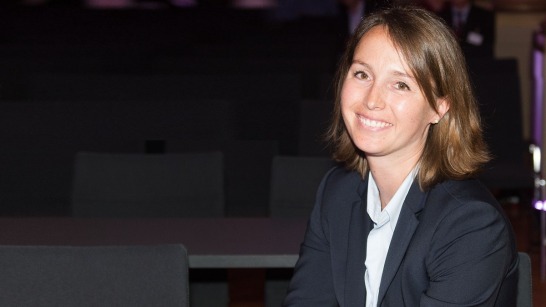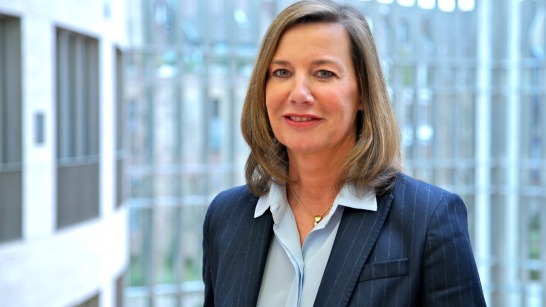Dr. Reuter, at 32 years old, you’re the youngest female supervisory board member in Germany. How did that come about?
An external recruitment consultant contacted me about the post on KION’s Supervisory Board. At the time, I was head of the production management department in the Laboratory for Machine Tools and Production Engineering (WZL) at RWTH Aachen University where, among other things, I helped to build a demonstration factory for Industry 4.0. A few meetings took place, including with the chairman of the Supervisory Board, Dr. John Feldmann, and this ultimately led to me being proposed for election as a new member of the Supervisory Board at the 2016 Annual General Meeting.
What exactly do you do as part of your work on the KION Supervisory Board?
The Supervisory Board is involved in all the Company's key decisions, advises the Executive Board on significant matters relating to the management of the Company, and monitors the Executive Board’s running of the Company's business. We hold regular meetings at which we look at and discuss current business performance, significant business transactions, the Company's strategy, corporate governance, and other matters with the Executive Board. There are also conference calls, in many cases for information purposes, and bilateral discussions. The Supervisory Board visits KION plants at regular intervals, too.
After your degree, you obtained your PhD at the WZL and then worked there as head of the production management department in the chair of production engineering. You are now at Airbus Defence and Space GmbH. What experience do you bring to the KION Supervisory Board as a result of this background?
During my time at the WZL, I gained a wealth of experience in production management and logistics. In 2012, I was able to secure an Industry 4.0 research project for our chair. It was one of the first in Germany in this area and focused on high-resolution production control based on intelligent sensors. Since then, I’ve been closely involved in the field of Industry 4.0 and digital transformation, both in research projects and in consultancy projects with industrial companies. In parallel, we built a demonstration factory for Industry 4.0 in Aachen, where all kinds of new solutions can be trialed and prototype electric vehicles can be manufactured. As a result, I can contribute my expertise in areas such as Industry 4.0, new technologies and business models, and digital production systems to the KION Supervisory Board.
Why did you decide to spend a year in China during your studies, and how has it influenced you?
There were two main reasons for going to Beijing for my year abroad. Firstly, I was keen to get to know China as an emerging economic power, to experience its culture, and to find out more about the country and its people. I’d already visited many western countries, but I didn’t know Asia at all. Secondly, RWTH Aachen University had a long-standing exchange program with Tsinghua University in Beijing. Tsinghua University is one of the best universities in the world, which meant I could be sure of receiving the same high standard of education as in Germany.
Not only did you spend a year abroad, you’ve also obtained a doctorate and you hold a position with a high level of responsibility at a very young age. What drives and motivates you?
For me, it’s important to continually develop and to learn. I seek out challenging environments in which I can learn from others and, at the same time, contribute my own expertise. It’s also important to me to work with people. I find it exciting to work out how to make best use of people’s individual strengths so that the end result is better than if each one of them had ‘battled’ alone.
Since 2016, there has been a quota for women when filling vacancies on the supervisory boards of large German companies. What is your view on this as a woman? How do you find working with mostly men?
In my opinion, there are different ways of looking at the quota for women. On the one hand, women of course don’t want to be hired for a role solely because of their gender. In recruitment, the focus naturally ought to be on qualifications and suitability in terms of the job requirements. We also need to remember that there are very few female students in some disciplines, which then means fewer women are working in these areas. On the other hand, we do see that, particularly at the more senior management levels, that a rather old-fashioned understanding of roles prevails, making it almost impossible for women to move into higher-level management positions. I therefore believe that a quota for women – perhaps even a company-specific one – is necessary in order to raise awareness of the imbalance in boardrooms and to give women access to those networks that appear to be exclusively open to men. Relying on companies to take the initiative does not seem to be sufficient.
Working with a group of male colleagues is a matter of course for me. I’ve been in male-dominated environments since the first day of university, so it doesn’t feel at all unusual to me.
What career tips do you have for women?
Young people should have confidence in their own abilities and turn their passion into their career. I advise women, in particular, not to be put off by subjects or areas that are seen as male-dominated. Internships are a good way of gaining experience and can help you decide what career to pursue. Once you start work, it’s important to build up a network and to find people who’ll mentor and encourage you, who’ll support you in achieving your goals.
Your discipline – engineering – is still seen as being a male domain. Why do you think a relatively small proportion of women choose this subject, and what needs to change so that more young women take an interest in it?
I get the impression that children and young people are stereotyped according to their gender at an early age. To exaggerate slightly, girls play with dolls, boys with toy fire trucks. I think that parents, as well as teachers in kindergartens and schools, need to more openly encourage children’s strengths and interests. I also believe that schools don’t have an adequate way of conveying knowledge or preparing their students for university. When I go into schools to promote technical degree courses, young women in particular are often completely surprised about what these involve, and what future opportunities these subjects will open up for them.
You worked at the university in Aachen even after you gained your PhD. How important, in your view, is the relationship between academia and industry? Should KION be collaborating more closely with universities?
I believe that close ties between academia and industry are important because there are advantages for both sides. Universities benefit by gaining an understanding of the challenges faced by companies, enabling them to focus on these in their research. At the same time, industry benefits from the results of research and gets access to cutting-edge technologies. There’s a kind of symbiosis between academia and industry.
Finally, a personal question. What do you enjoy doing outside of work? And do you have the time to do it?
I try to spend as much time as possible with my family. Family comes first in my eyes. I’ve also ridden since I was a child and I train young dressage horses. I find it’s a good way to relax. Of course I need to be well organized and have the support around me to be able to juggle everything.


_image_546x307.jpg)